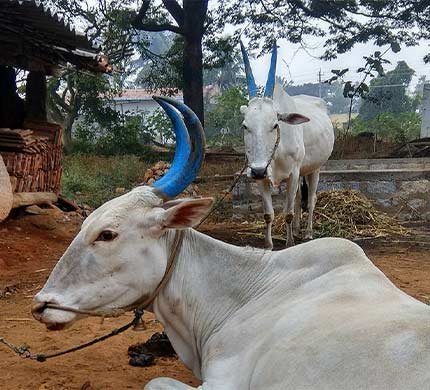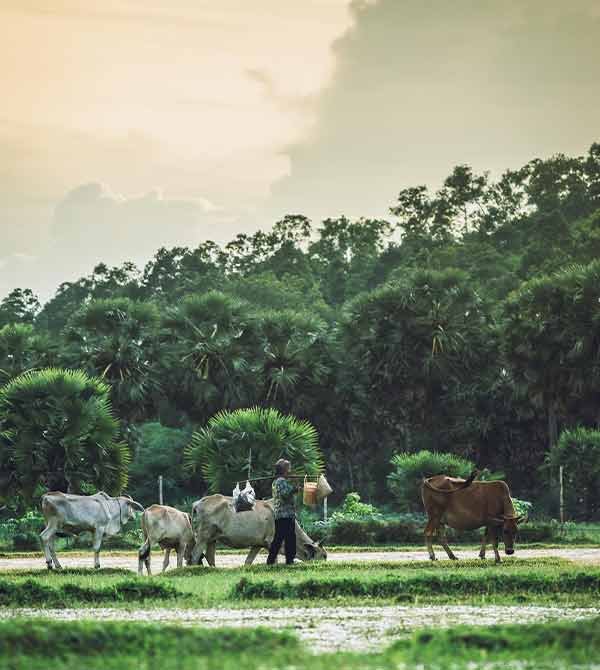Hallikar
- Temperature:Approximately 20-34 degrees C
- Milk:1.5 to 2 liters per day
- Food:Various types of grasses, Hay and Silage
- Pregnancy:Approximately 280 to 290 days
- Nationality:India

General Information
Hallikar is a breed of cattle that is native to the state of Karnataka in southern India. They are a hardy breed that is well adapted to the local environment and are known for their strength and endurance. Hallikars are predominantly used as draught animals and are often used for ploughing fields and for transportation of goods. They are also used for their meat and milk, although their milk production is relatively low.
The Hallikar is a medium-sized breed with a compact and muscular body. They are usually black, although some individuals may have white markings on their face and legs. They have a long, narrow head and large, curved horns that point upwards and outwards. Hallikars are well known for their ability to work in hot and humid conditions and are often used in agriculture and transportation in southern India.
Where we find this cow to buy?
If you are located in India, you may be able to find Hallikar cattle for sale in local livestock markets or through agricultural associations and organizations that promote the breed.
You can also try contacting local Hallikar breeders or farmers who may be willing to sell their cattle.
In addition, there are several online platforms that connect buyers and sellers of livestock, including Hallikar cattle.
Some popular online marketplaces in India for livestock include OLX, Quikr, and IndiaMART.
It’s important to note that purchasing livestock can involve some risks, so it’s important to do your research and verify the reputation and credibility of the seller before making a purchase.
It’s also a good idea to inspect the cattle in person and to ask for any relevant health certificates or documentation before finalizing the transaction.

How to increase milk production in Hallikar
There are several ways to increase milk production in Hallikar cattle:
01
Providing a balanced and nutritious diet to Hallikar cows is essential for increasing milk production.
02
Regular milking at appropriate intervals is important to maintain milk production in cows. Milking the cows at the same time every day and not skipping milking sessions is important.
03
Maintaining good hygiene and cleanliness in the cowshed is essential to prevent infection.
04
Adequate clean water should be available to the cows at all times. Water is essential for milk production and cows should be provided with fresh and clean water regularly.
Medicine
It’s important to note that the use of medications in livestock should be done only under the guidance and supervision of a qualified veterinarian to ensure that the medication is administered properly and at the correct dosage.
That being said, there are several types of medications that may be prescribed by a veterinarian for Hallikar cattle, including:
01
AntibioticsThese are medications used to treat bacterial infections in cattle.
02
AnthelminticsThese are medications used to treat parasitic infections, such as worms, in cattle.
03
Anti-inflammatory drugsThese are medications used to reduce inflammation and pain in cattle.
04
HormonesHormonal treatments can be used to increase milk production or induce ovulation in cows.
Pregnancy
Providing a balanced and nutritious diet to the pregnant cow is essential for the health and development of the fetus. The diet should include high-quality forage, such as green fodder and hay, as well as concentrates like grains and protein-rich supplements.
Regular health checks by a qualified veterinarian are important to monitor the health and progress of the pregnancy. The veterinarian may perform ultrasounds or other diagnostic tests to ensure the fetus is developing normally.
Pregnant cows should be vaccinated against common diseases to protect the health of the fetus.
Provide a clean and safe environment for the cow to give birth.
Important!
It’s important to note that managing pregnancy in Hallikar cattle requires proper knowledge and experience. It’s recommended to consult with a qualified veterinarian or agricultural expert for advice and guidance on managing pregnancy and calving in Hallikar cattle.
Food
Hallikar cattle, like all cattle, require a balanced and nutritious diet to maintain good health and productivity. The diet should be rich in fiber, energy, protein, vitamins, and minerals. Here are some types of foods that are suitable for Hallikar cattle:
Fresh green fodder, such as alfalfa, clover, and ryegrass, is a good source of protein, energy, and fiber.
High-quality hay, such as legume or grass hay, is a good source of fiber and nutrients.
Silage is made by fermenting chopped green forage, such as corn or grass, and is a good source of energy.
Concentrates such as grains, grains, and protein-rich supplements are a good source of energy and protein.
Facts
Here are some interesting facts about Hallikar cattle:
This cattle are able to survive in drought-prone areas, providing food for other breeds.
Hallikar cattle have a distinctive grey or black coat, muscular build, and long, curved horns.
Hallikar cattle have a long lifespan, with some individuals living up to 20 years or more.
Hallikar cattle were used for agricultural work, such as plowing fields and transporting goods.
Hallikar cattle are native to the southern part of India, specifically the states of Karnataka, Andhra Pradesh, and Tamil Nadu.
Hallikar cattle are listed as a vulnerable breed by the FAO due to their declining population numbers.
Hallikar cattle are deeply embedded in southern Indian culture, used in religious festivals and ceremonies.
Hallikar cattle are well-adapted to hot and humid climates, and are known for their ability to withstand heat and drought conditions.